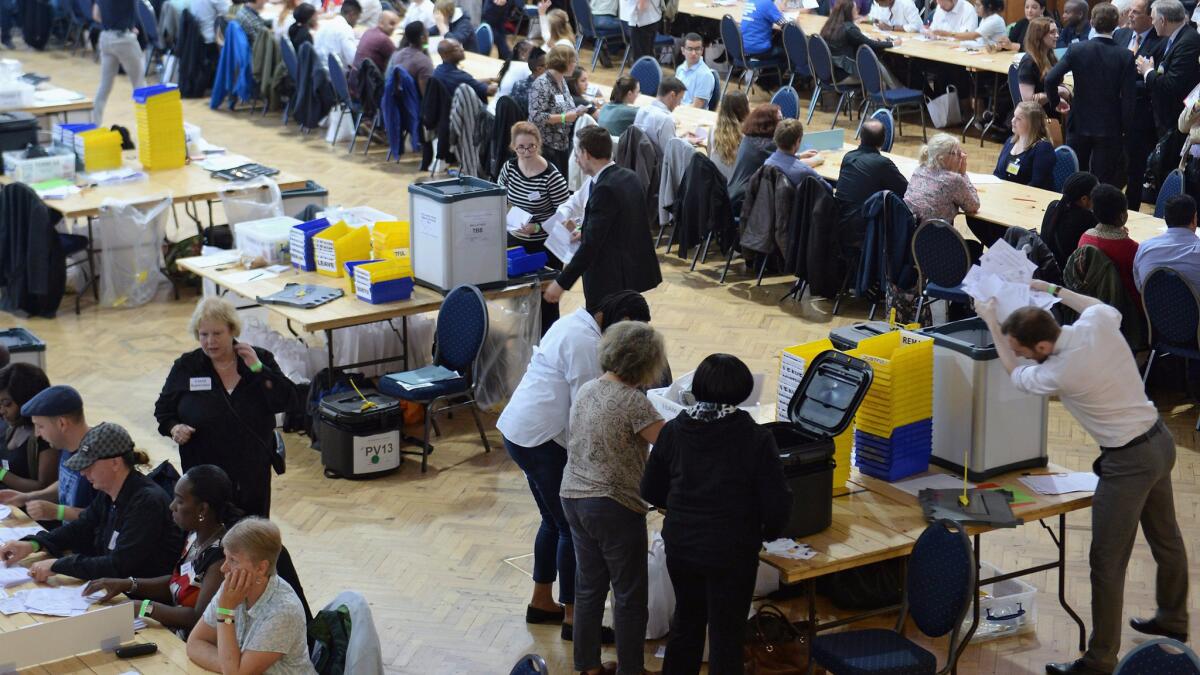Op-Ed: The isolationist catastrophe of ‘Brexit’

- Share via
On Thursday British voters willfully walked off a cliff when they decided to leave the European Union. The “Brexit” victory is a defeat for Britain, Europe and the global economy.
Tens of millions of Britons voted for isolation — to go it alone — rather than for cooperation. The European Union just lost a sixth of its economy, roughly akin to Florida and California seceding from the United States. The impact on the British economy could be catastrophic. Europe’s unified stance against a reemerging and aggressive Russia will be splintered.
Moreover, the vote doesn’t mean that debates over Britain’s relationship with Europe, or its place in the wider world, are suddenly resolved. It does mean that politicians — and not just those on the banks of the Thames in Westminster — need to wake up. On both sides of the Atlantic, governments and politics are not working.
We find ourselves in a moment of global fear. The democratic identities of Britain and the United States are under threat — not from immigrants or even changing values, but from nationalists and xenophobes exploiting citizens’ darkest worries with populist projects, including Donald Trump’s campaign for the U.S. presidency and Brexit. To many voters, the world is a scary place. Terrorists seem to lurk everywhere. Uncertainty surrounds us. Change is rapid and some aren’t keeping up. Unsurprisingly, politicians of many stripes are capitalizing on our fears to rally voters against trade, immigration and international cooperation.
The costs will be substantial. Economists, business leaders and scholars almost universally agree that Britain’s retreat from the EU is a self-inflicted economic blunder. Recessions are contagious, and given London’s place as a global financial hub, Brexit will give Britain a particularly virulent cough. The pound’s value will likely tumble. The British treasury estimates that the nation’s households each stand to lose an average of £4,300, or about $7,000. And yet, tens of millions of voters were willing to take that hit.
The quintessential anti-EU voter, an aging unemployed white working-class citizen in northern England, might feel a certain solidarity with a similar Trump voter in rural America. Both have reason to feel victimized by a global economy that has left them behind. Both have concluded that the culprits are out-of-control immigration and an unresponsive government far away, in Washington or Brussels. And both have decided the answer is disengagement, solving problems alone at home rather than preventing them through cooperation abroad.
Ever-increasing globalization has created an unprecedented surge in prosperity, but it has also ushered in jarring changes.
This is the glaring contradiction in the muscular nationalism of right-wing populism, blended with isolationism, that seeks to withdraw from international unions: It cannot shape a better world by shutting the world out. The same people who cheer when Trump laments the decline of American leadership want to ignore key global issues and put “America First.” The people who voted for Brexit, attempting to create a border between Britain and challenges such as the refugee crisis, seem to think Britain can solve such problems without consulting Germany or France or, worst of all to them, Brussels.
The world doesn’t work that way, and it hasn’t for decades. Ever-increasing globalization has created an unprecedented surge in prosperity, but it has also ushered in jarring changes. The rough edges of those changes can only be overcome with more aggressive cooperation and engagement, not less. Whether it’s the risks of terrorism, the tragic flow of refugees, or economic shocks, Britain cannot solve problems alone and neither can the United States.
The solution, then, is a politics and a foreign policy that acknowledge the potency and importance of national identity while aiming to lead the world rather than leave it aside. Xenophobia will eventually fade if genuine policy reforms provide new opportunities to the victims of globalization. We need leaders on both sides of the Atlantic who heed the legitimate fears of their citizens and at the same time explain that solutions will come from standing together with other nations rather than standing alone.
Brexit voters and Trump supporters sporting “Make America Great Again” hats believe they have lost too much for too long. Their complaint is understandable. But turning inward will only make their problems worse and the world more dangerous. Britain narrowly succumbed to isolationist populism Thursday. Let’s hope Americans don’t make the same mistake by voting for a Trump presidency come November.
Brian Klaas is a fellow in comparative politics at the London School of Economics and Marcel Dirsus is a lecturer in politics at the University of Kiel in Germany.
MORE FROM OPINION
Brexit’s lesson: Do not underestimate angry voters
My white privilege meets Sonia Sotomayor’s scathing attack on police power
Is the God of Jews, Christians and Muslims a homophobe?
Follow the Opinion section on Twitter @latimesopinionand Facebook
More to Read
A cure for the common opinion
Get thought-provoking perspectives with our weekly newsletter.
You may occasionally receive promotional content from the Los Angeles Times.










